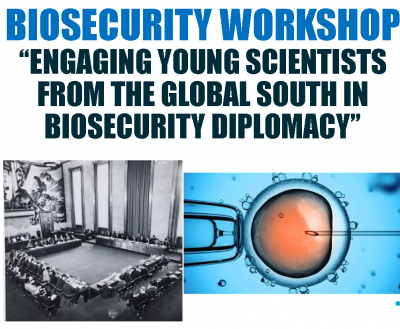


A world free from biological weapons needs not only scientific and technological innovation, but also youth and women’s empowerment and inclusion in multilateral Biological Weapons Convention discussions. For this reason, the Implementation Support Unit (ISU) of the Biological Weapons Convention (BWC) and the United Nations Office for Disarmament Affairs (UNODA) will convene the workshop 'Engaging Young Scientists from the Global South in Biosecurity Diplomacy' from 3 to 4 August 2019 near Geneva, Switzerland. The workshop will be financed under the auspices of European Union Council Decision 2019/97/CFSP in support of the BWC, managed and implemented by UNODA.
The workshop aims to bring together up to 20 young and talented scientists from the Global South working on topics related to the BWC. Participants will be selected on the basis of their professional backgrounds and accomplishments. Young female scientists from the Global South are particularly encouraged to apply.
The workshop will provide an informal and interactive space for young scientists from the Global South to share their knowledge, insights and concerns, and to provide their vision for the future of responsible bioscience in their own countries. It will also encourage the development of networks of young professionals and provide an opportunity for capacity development in biosafety and biosecurity.
Workshop participants will hear from expert speakers on topics such as science diplomacy, science advice in the context of the BWC, dual-use research of concern, responsible and ethical science and innovation, global health security and other science and technology topics of relevance to the BWC.
DATES AND LOCATION
The two-day workshop will take place from 3 to 4 August 2019, immediately following the conclusion of the BWC Meeting of Experts on science and technology (MX2) that will be held in Geneva on 31 July and 2 August 2019. Workshop participants are expected to arrive on 1 August 2019 so as to attend an orientation programme and the last day of MX2.
MX2 focuses on developments in the field of science and technology related to the Convention. The timing of the workshop will allow participants to attend the second day of MX2 in order to gain a broader awareness of the BWC and an insight into the conduct of multilateral disarmament negotiations. Workshop participants will be able to engage directly with diplomats from their Permanent Missions in Geneva and with high-level experts in the life sciences.
Further details of the event will be communicated to selected participants.
PARTICIPANTS
The workshop is open to those who:
(i) have an advanced degree in the life sciences or a related discipline from a recognized university or institution;
(ii) are citizens of a low- or middle-income BWC State Party (for a full list of BWC States Parties, click here);
(iii) have been working in the life sciences (academia, research, or industry) for at least five years;
(iv) are active scientists under the age of 40; and
(v) have a strong command of written and spoken English, as the workshop will be fully conducted in English. Female candidates are strongly encouraged to apply. The selection process will be guided by the need to ensure the highest quality of participants while maintaining a gender and regional balance
HOW TO APPLY
The deadline to receive applications is 14 June 2019. The application form must be filled out online here.
Applications will be carefully screened by an expert panel on the basis of the criteria specified above. Applicants should complete the application form online and submit the required documentation electronically to bwc@un.org.
The required documentation includes the following:
(a) curriculum vitae (maximum five pages);
(b) one-page description of your motivation to participate in the workshop (in font Times New Roman, size 12, single space paragraphs);
(c) letter of recommendation from a senior member of your institution that addresses your qualifications and attests to the relevance of the workshop to the work of the institution;
(d) digital image of the personal identification page of your passport.
Incomplete or improperly filled-out application forms will not be considered. Applications without full supporting documentation will not be accepted.